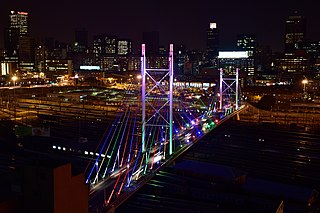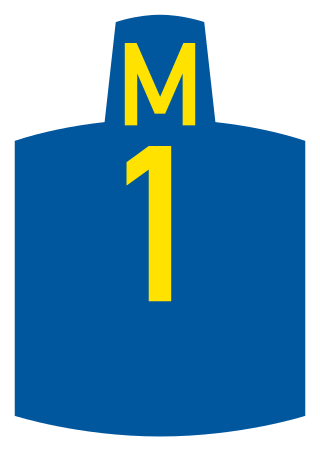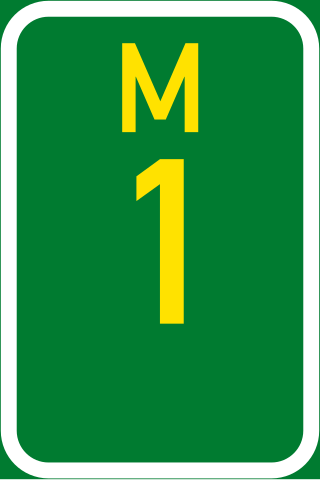Port Elizabeth, like most South African cities, uses Metropolitan or "M" routes for important intra-city routes, a layer below National (N) roads and Regional (R) roads. Each city's M roads are independently numbered. [1]
Contents


Port Elizabeth, like most South African cities, uses Metropolitan or "M" routes for important intra-city routes, a layer below National (N) roads and Regional (R) roads. Each city's M roads are independently numbered. [1]


| No. | Direction | Description of Route | Suburbs | Street Names |
|---|---|---|---|---|
| East/West | N2 (at level of Bluewater Bay) - R102 (at level of Amsterdamhoek) | Bluewater Bay, Amsterdamhoek | Weinronk Way, Hillcrest Dr., Riverside Dr., Tippers Creek, Amsterdamhoek Dr. | |
| East/West | N2 (at level of Deal Party) - R102 (same) | Deal Party | John Tallant Rd. | |
| North/South, then NW/SE then East/West | R102 (at Deal Party, south of M3) - N2 (interchange, freeway starts) - M5 (interchange) - M7 (interchange) - M9 (freeway ends) - M13 - M11 - M13 - ends in Schoenmakerskop at intersection with M18 | Deal Party, North End, Central, South End, Humewood, Summerstrand, Schoenmakerskop | Baxter St., Burman Rd., Settlers Freeway, Humewood Rd., Beach Rd., Marine Dr. | |
| NE/SW | M4 (at level of North End) - R102 - M10 - M26 - R102 (Mill Park) | North End, Mount Croix, Mill Park | Mount Rd. | |
| East/West | R75 (Despatch; cosigned with M19) - M19 (Eastern Despatch) - R75 (Western Despatch) - R334 / M20 (Uitenhage) | Despatch, Uitenhage | Main St., Botha St., Union Ave., Caledon Ave. | |
| East/West | M4 (North End) - R102 - R102 (Mill Park) - M18 - M12 (cosigned for 1 block) - M15 (cosigned for 2 blocks) - N2 (interchange) - R102 (Linton Grange) | North End - Central - Mill Park - Walmer - Springfield - Lorraine - Sunridge Park - Framesby - Linton Grange | Albany Rd., Roseberry Ave., Target Kloof Rd., River Rd., Outspan Rd., 8th Ave., Main Rd., 17th Ave., Circular Dr., Kragga Kamma Rd., Samantha Way, Bramlin St. | |
| NE/SW | N2 (Sidwell) - R75 - M10 - M26 - R102 (Newton Park) | Sidwell, Korsten, Perridgevale, Newton Park | Kempston Rd., C. J. Langhenhoven Dr. | |
| East/West | M4 (South End) - M11 - M18 - M12 - leaves town to Seaview - M15 (area of Colleen Glen) | South End, Walmer, Greenshields Park, Charlo, Mount Pleasant, Seaview | Walmer Blvd., Heugh Rd., Buffelsfontein Rd. | |
| SE/NW (mostly) | R102 (North End) - M5 - M8 - N2 - changes to NE/SW as Nooitgedacht Road - M14 - resumes SE/NW - M19 - M22 - R334 / M20 | North End, Sydenham, Sidwell, Gelvandale, Cleary Park, Salsoneville, Loonatville, Booysen Park - Khayamnandi - Despatch - Uitenhage | Harrower Rd., Standford Rd., Nooitgedacht Rd., Old Uitenhage Rd., Algoa Rd., Durban St. | |
| East/West | M4 (Humewood) - M13 - Port Elizabeth Airport - M9 (Walmer) | Humewood, Forest Hill, Walmer | La Roche Dr., Allister Miller Dr., 3rd Ave | |
| North/South | N2 (Cotswold) - M26 - R102 - M7 - M9 | Cotswold, Newton Park, Mangold Park, Walmer Downs, Walmer, Springfield, Charlo | Disa Ave., William Moffett Expressway, 17th Ave. | |
| SE/NW | M4 (Humewood) - M11 - M4 (Summerstrand) | Humewood, Forest Hill, Summerstrand | Driftsands Dr., Strandfontein Rd., Admiralty Way | |
| East/West | R367/M19 (Perseverance) - R75 - R368/M16 - M10 | Perseverance, Kwamagxaki, Govan Mbeki, Kleinskool, Kwanoxolo, Booysen's Park | Main Rd., Old Uitenhage Rd. | |
| East/West | N2 (Sunridge Park) - M7 - M7 - leaves town - M9 - N2 (out of town) | Sunridge Park, Lorraine, Kamma Park, Theescombe | Kragga Kamma Rd., Seaview Rd. | |
| North/South | R335 (Motherwell) - R367/M19 (Swartkops) | Motherwell, Swartkops | Dibanisa Rd. | |
| North/South | M7 (Walmer) - M9 - M4 | Walmer, Port Elizabeth, Schoenmakerskop | 10th Ave., Victoria Dr. | |
| ESE/WNW | R102 (Swartkops) - M17 - M14 - R75 - M6 (co-signed) - M6 - R75 - M10 (Despatch) | Swartkops, Perseverance, Despatch | Trunk Rd., Main St., Botha St. | |
| East/West | M5 (North End) - M8 - M12 (Newton Park) | North End, Kensington, Adcockvale, Newton Park | Diaz Rd., Burt Dr. |

Cape Town is the legislative capital of South Africa. It is the country's oldest city and the seat of the Parliament of South Africa. It is the country's second-largest city, after Johannesburg, and the largest in the Western Cape. The city is part of the City of Cape Town metropolitan municipality.

The Dwight D. Eisenhower National System of Interstate and Defense Highways, commonly known as the Interstate Highway System, or the Eisenhower Interstate System, is a network of controlled-access highways that forms part of the National Highway System in the United States. The system extends throughout the contiguous United States and has routes in Hawaii, Alaska, and Puerto Rico.

Johannesburg is the most populous city in South Africa with 4,803,262 people, and is classified as a megacity; it is one of the 100 largest urban areas in the world. It is the provincial capital of Gauteng, the wealthiest province in South Africa. Johannesburg is the seat of the Constitutional Court, the highest court in South Africa. Most of the major South African companies and banks have their head offices in Johannesburg. The city is located within the mineral-rich Witwatersrand hills, the epicentre of the international-scale mineral, gold and (specifically) diamond trade.

Durban is the third-most populous city in South Africa, after Johannesburg and Cape Town, and the largest city in the province of KwaZulu-Natal. Situated on the east coast of South Africa, on the Natal Bay of the Indian Ocean, Durban is South Africa's busiest port and was formerly named Port Natal. North of the harbour and city centre lies the mouth of the Umgeni River; the flat city centre rises to the hills of the Berea on the west; and to the south, running along the coast, is the Bluff. Durban is the seat of the larger eThekwini Metropolitan Municipality, which spans an area of 2,556 km2 (987 sq mi) and had a population of 4.2 million in 2022, making the metropolitan population one of Africa's largest on the Indian Ocean. Within the city limits, Durban's population was 595,061 in 2011. The city has a humid subtropical climate, with hot, wet summers and mild, dry winters.

Highways in Australia are generally high capacity roads managed by state and territory government agencies, though Australia's federal government contributes funding for important links between capital cities and major regional centres. Prior to European settlement, the earliest needs for trade and travel were met by narrow bush tracks, used by tribes of Indigenous Australians. The formal construction of roads began in 1788, after the founding of the colony of New South Wales, and a network of three major roads across the colony emerged by the 1820s. Similar road networks were established in the other colonies of Australia. Road construction programs in the early 19th century were generally underfunded, as they were dependent on government budgets, loans, and tolls; while there was a huge increase in road usage, due to the Australian gold rushes. Local government authorities, often known as Road Boards, were therefore established to be primarily responsible for funding and undertaking road construction and maintenance. The early 1900s saw both the increasingly widespread use of motorised transportation, and the creation of state road authorities in each state, between 1913 and 1926. These authorities managed each state's road network, with the main arterial roads controlled and maintained by the state, and other roads remaining the responsibility of local governments. The federal government became involved in road funding in the 1920s, distributing funding to the states. The depression of the 1930s slowed the funding and development of the major road network until the onset on World War II. Supply roads leading to the north of the country were considered vital, resulting in the construction of Barkly, Stuart, and Eyre Highways.

U.S. Highway 16 (US 16) is an east–west United States Numbered Highway between Rapid City, South Dakota, and Yellowstone National Park in Wyoming. The highway's eastern terminus is at a junction with Interstate 90 (I-90)/US 14, concurrent with I-190, in Rapid City. The western terminus is the east entrance to Yellowstone National Park, concurrent with US 14 and US 20. US 16 used to extend all the way to Michigan but has been truncated in favor of I-90 and I-96.
A routenumber, designation or abbreviation is an identifying numeric designation assigned by a highway authority to a particular stretch of roadway to distinguish it from other routes and, in many cases, also to indicate its classification, general geographical location and/or orientation. The numbers chosen may be used solely for internal administrative purposes; however, in most cases they are also displayed on roadside signage and indicated on maps.

A controlled-access highway is a type of highway that has been designed for high-speed vehicular traffic, with all traffic flow—ingress and egress—regulated. Common English terms are freeway, motorway, and expressway. Other similar terms include throughway or thruway and parkway. Some of these may be limited-access highways, although this term can also refer to a class of highways with somewhat less isolation from other traffic.

Metropolitan Routes in Johannesburg, also called Metro Roads or Metro Routes are designated with the letter M, and are usually major routes around Johannesburg and some areas declared part of Greater Johannesburg.
Buffalo City, like most South African cities, uses Metropolitan or "M" routes for important intra-city routes, a layer below National (N) roads and Regional (R) roads. Each city's M roads are independently numbered.

The City of Tshwane like most South African metropolitan areas uses Metropolitan or "M" routes for important intra-city routes, a layer below National (N) roads and Regional (R) roads. Each city's M roads are independently numbered.

In South Africa some roads are designated as numbered routes to help with navigation. There is a nationwide numbering scheme consisting of national, provincial and regional routes, and within various urban areas there are schemes of metropolitan route numbering.

The City of Cape Town like most South African metropolitan areas, uses Metropolitan or "M" routes for important intra-city routes, a layer below National (N) roads and Regional (R) roads. Each city's M roads are independently numbered.

Ethekwini, like most South African metropolitan areas, uses Metropolitan or "M" routes for important intra-city routes, a layer below National (N) roads and Regional (R) roads. Each city's M roads are independently numbered.
Pietermaritzburg, like most South African cities, uses Metropolitan or "M" routes for important intra-city routes, a layer below National (N) roads and Regional (R) roads. Each city's M roads are independently numbered.
The Philippine highway network is a network of national roads owned and maintained by the Department of Public Works and Highways (DPWH) and organized into three classifications according to their function or purpose: national primary, secondary, and tertiary roads. The national roads connecting major cities are numbered from N1 to N83. They are mostly single and dual carriageways linking two or more cities.

The M4 is a long metropolitan route in the City of Cape Town Metropolitan Municipality in South Africa. It connects the Cape Town CBD with the Cape of Good Hope via Wynberg, Muizenberg and Fish Hoek. Originally, it was the main route connecting the Cape Town CBD with the Southern Suburbs and is thus named Main Road for much of its length. From the CBD to Kirstenhof, it is parallel to the M3 Freeway.

The M9 is a long metropolitan route in the City of Cape Town, South Africa. It connects Sir Lowry's Pass Village with Wynberg via Somerset West, Firgrove, Macassar, Khayelitsha and Nyanga.
The M10 is a metropolitan route in the City of Cape Town Metropolitan Municipality, South Africa. It connects the town of Bellville with Philippi on the Cape Flats.
The M12 is a long metropolitan route in the City of Cape Town, South Africa. It connects Burgundy Estate with Stellenbosch via Parow, Elsie's River and Kuils River.